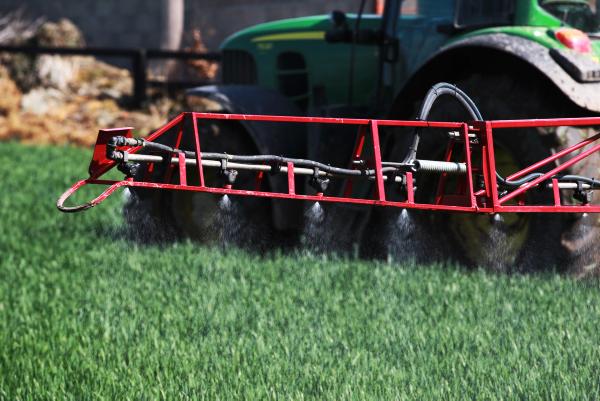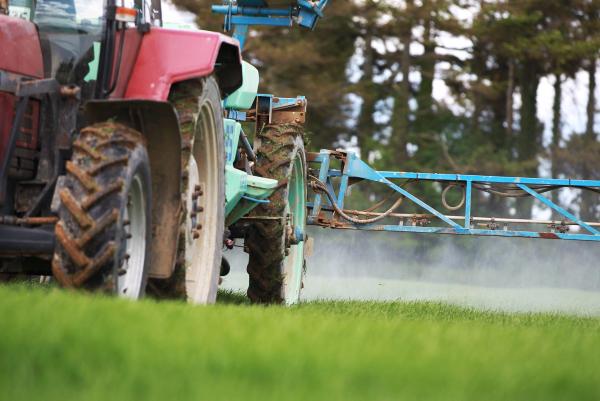As we get into the busy spraying season, this article serves as a reminder of the obligations of the Sustainable Use of Pesticides Directive (SUD) as they apply to farmers, advisers and the retail trade.
The SUD comprises four basic elements:
Training and registration.Testing of application equipment.Controls on storage, supply and use.Integrated pest management (IPM).The SUD aims to achieve a balance between ensuring human and environmental safety while at the same time maintaining the viability of the farming and amenity sectors. For the present, only plant protection products (PPPs) are included within the scope of the SUD.
PPPs are used to protect plants from diseases or pests (or to control the growth of plants) in agriculture, horticulture, forestry, amenity, home garden and non-crop areas. By their nature, these are biologically active and designed to control organisms that are harmful to crops, for example weeds, insects or plant pathogens.
Professional users
Since 26 November 2015, only a registered professional user (PU) can apply pesticides authorised for professional use.
Registration requires that a certain standard of training has been achieved. Some individuals may already have reached the required standard if they completed a relevant module when completing various Teagasc courses (check with Teagasc if the course you completed qualifies you at www.teagasc.ie/training/courses/pesticide-training.asp).
Once you have achieved the relevant qualified standard, you must still apply online to register with the DAFM at www.pcs.agriculture.gov.ie/sud/sudreg/. If you are not a registered PU, that is if you do not have a PU number from DAFM, you are not permitted to apply professional-use products.
If you are subject to a DAFM inspection (for example cross compliance), you will be required to provide proof of the qualification claimed by registering.
As well as being registered, end users (farmers) are required to maintain accurate records of use for all PPPs used by them (or another registered user) on their holding. Every farmer is obliged to keep these records regardless of whether they are the PU who applied the product or not.
These records of use must be available for inspection if requested. A template for the information required can be downloaded at www.pcs.agriculture.gov.ie/sud/professionaluserssprayeroperators/.
It is essential to record what you used on the day it is used. Do not leave this to the end of the week or until the inspector calls to the door.
Additionally, there is a requirement that PPPs be stored in a locked, dedicated store, that is bunded to prevent accidental leakage to drains, wells or water courses.
Stores do not have to be purpose-built, but virtually all end-users will require some amount of storage capacity. It is generally not acceptable to claim that there is no requirement for chemical storage because all product is used on the day it is purchased.
Retailers are now required to keep records of all sales of PPPs and must provide the same to the DAFM if requested.
In addition to the requirement that all users of professional PPPs be trained and registered, the equipment used for application must also be fit for purpose.
From 26 November 2016, all sprayers with a boom width greater than 3m, and all orchard and blast sprayers, will have to be tested by DAFM-registered inspectors. These inspectors must carry out an agreed testing protocol and issue a certificate of compliance following the successful completion of the test.
The inspection interval must not exceed five years up to 2020 and then every three years thereafter. A list of approved sprayer inspectors is available at www.pcs.agriculture.gov.ie/sud/equipmentinspectors/.
All registered sprayer testers are subject to DAFM audit to ensure that appropriate standards are being maintained.
Integrated pest
management
The SUD also requires that farmers demonstrate the implementation of IPM on their holding. This means that a farmer must consider other options before resorting to PPPs. Examples would include topping to help control weeds or the use of disease-resistant varieties to reduce the need for fungicide sprays. Many farmers already practise IPM strategies.
To help in this regard, an IPM check sheet (www.pcs.agriculture.gov.ie/sud/integratedpestmanagement/)should be completed annually by all farmers and must be available for inspection.
Additionally, records of PPP usage must now show the requirement to justify the use of all products listed in the worksheet.
Professional advisers
The SUD requires that all pesticide advisers (PA) practising in Ireland are registered with the DAFM. To be included on the current list, a PA must have completed the new Level 7 Professional Diploma in Integrated Pest Management and the Sustainable Use of Pesticides or be the holder of an equivalent qualification deemed acceptable to the DAFM.
Professional advisers must comply with requirements for continuous professional education (CPE). It is the responsibility of each PA to make provision for their personal CPE credits to be recorded and maintained.
Irish Agricultural Supply Industry Standards (IASIS) has developed CPE rules for PAs and this is recognised as meeting DAFM requirements. To use this option to record CPE credits, PAs must apply to IASIS (www.iasis.ie).
At the end of each year, IASIS will provide a list of the PAs who have met their CPE requirements, thus allowing them to remain on the register of approved PAs. Additionally, alternative CPE systems may be recognised in the future.
A registered PA is automatically considered to be qualified as a PU, but registration is still essential to be included on the PU list.
Retailers
Since 26 November 2015, all outlets selling PPPs (professional or amateur) had to be registered. These obviously include agricultural businesses but also hardware shops, garden centres and any other outlets stocking such products.
Since that date, it is illegal to sell such products without registration. For businesses with multiple outlets, each individual outlet must be registered. Registering a premises commits the owner or manager to ensuring that the store and/or retail space for PPPs complies with the necessary standards. Details of the standards required are available on the PCS website. These vary depending on the size of the business.
In addition to the above, it is also a requirement that each outlet has a qualified or trained individual on site at all times to provide information on product use, health and environmental risk, and safety. Such individuals, known as pesticide distributors (PDs), must complete the Fetac Level 5 course in handling and distribution of pesticides. An online course for smaller businesses selling only PPPs for non-professional use is also available.
Since the start of 2014, it has been a requirement that full traceability is in place for all professional-use PPPs. This applies from the wholesaler through to the end user.
While farmers are required to maintain records for three years, retailers will have to maintain records for five years.
As we get into the busy spraying season, this article serves as a reminder of the obligations of the Sustainable Use of Pesticides Directive (SUD) as they apply to farmers, advisers and the retail trade.
The SUD comprises four basic elements:
Training and registration.Testing of application equipment.Controls on storage, supply and use.Integrated pest management (IPM).The SUD aims to achieve a balance between ensuring human and environmental safety while at the same time maintaining the viability of the farming and amenity sectors. For the present, only plant protection products (PPPs) are included within the scope of the SUD.
PPPs are used to protect plants from diseases or pests (or to control the growth of plants) in agriculture, horticulture, forestry, amenity, home garden and non-crop areas. By their nature, these are biologically active and designed to control organisms that are harmful to crops, for example weeds, insects or plant pathogens.
Professional users
Since 26 November 2015, only a registered professional user (PU) can apply pesticides authorised for professional use.
Registration requires that a certain standard of training has been achieved. Some individuals may already have reached the required standard if they completed a relevant module when completing various Teagasc courses (check with Teagasc if the course you completed qualifies you at www.teagasc.ie/training/courses/pesticide-training.asp).
Once you have achieved the relevant qualified standard, you must still apply online to register with the DAFM at www.pcs.agriculture.gov.ie/sud/sudreg/. If you are not a registered PU, that is if you do not have a PU number from DAFM, you are not permitted to apply professional-use products.
If you are subject to a DAFM inspection (for example cross compliance), you will be required to provide proof of the qualification claimed by registering.
As well as being registered, end users (farmers) are required to maintain accurate records of use for all PPPs used by them (or another registered user) on their holding. Every farmer is obliged to keep these records regardless of whether they are the PU who applied the product or not.
These records of use must be available for inspection if requested. A template for the information required can be downloaded at www.pcs.agriculture.gov.ie/sud/professionaluserssprayeroperators/.
It is essential to record what you used on the day it is used. Do not leave this to the end of the week or until the inspector calls to the door.
Additionally, there is a requirement that PPPs be stored in a locked, dedicated store, that is bunded to prevent accidental leakage to drains, wells or water courses.
Stores do not have to be purpose-built, but virtually all end-users will require some amount of storage capacity. It is generally not acceptable to claim that there is no requirement for chemical storage because all product is used on the day it is purchased.
Retailers are now required to keep records of all sales of PPPs and must provide the same to the DAFM if requested.
In addition to the requirement that all users of professional PPPs be trained and registered, the equipment used for application must also be fit for purpose.
From 26 November 2016, all sprayers with a boom width greater than 3m, and all orchard and blast sprayers, will have to be tested by DAFM-registered inspectors. These inspectors must carry out an agreed testing protocol and issue a certificate of compliance following the successful completion of the test.
The inspection interval must not exceed five years up to 2020 and then every three years thereafter. A list of approved sprayer inspectors is available at www.pcs.agriculture.gov.ie/sud/equipmentinspectors/.
All registered sprayer testers are subject to DAFM audit to ensure that appropriate standards are being maintained.
Integrated pest
management
The SUD also requires that farmers demonstrate the implementation of IPM on their holding. This means that a farmer must consider other options before resorting to PPPs. Examples would include topping to help control weeds or the use of disease-resistant varieties to reduce the need for fungicide sprays. Many farmers already practise IPM strategies.
To help in this regard, an IPM check sheet (www.pcs.agriculture.gov.ie/sud/integratedpestmanagement/)should be completed annually by all farmers and must be available for inspection.
Additionally, records of PPP usage must now show the requirement to justify the use of all products listed in the worksheet.
Professional advisers
The SUD requires that all pesticide advisers (PA) practising in Ireland are registered with the DAFM. To be included on the current list, a PA must have completed the new Level 7 Professional Diploma in Integrated Pest Management and the Sustainable Use of Pesticides or be the holder of an equivalent qualification deemed acceptable to the DAFM.
Professional advisers must comply with requirements for continuous professional education (CPE). It is the responsibility of each PA to make provision for their personal CPE credits to be recorded and maintained.
Irish Agricultural Supply Industry Standards (IASIS) has developed CPE rules for PAs and this is recognised as meeting DAFM requirements. To use this option to record CPE credits, PAs must apply to IASIS (www.iasis.ie).
At the end of each year, IASIS will provide a list of the PAs who have met their CPE requirements, thus allowing them to remain on the register of approved PAs. Additionally, alternative CPE systems may be recognised in the future.
A registered PA is automatically considered to be qualified as a PU, but registration is still essential to be included on the PU list.
Retailers
Since 26 November 2015, all outlets selling PPPs (professional or amateur) had to be registered. These obviously include agricultural businesses but also hardware shops, garden centres and any other outlets stocking such products.
Since that date, it is illegal to sell such products without registration. For businesses with multiple outlets, each individual outlet must be registered. Registering a premises commits the owner or manager to ensuring that the store and/or retail space for PPPs complies with the necessary standards. Details of the standards required are available on the PCS website. These vary depending on the size of the business.
In addition to the above, it is also a requirement that each outlet has a qualified or trained individual on site at all times to provide information on product use, health and environmental risk, and safety. Such individuals, known as pesticide distributors (PDs), must complete the Fetac Level 5 course in handling and distribution of pesticides. An online course for smaller businesses selling only PPPs for non-professional use is also available.
Since the start of 2014, it has been a requirement that full traceability is in place for all professional-use PPPs. This applies from the wholesaler through to the end user.
While farmers are required to maintain records for three years, retailers will have to maintain records for five years.








SHARING OPTIONS